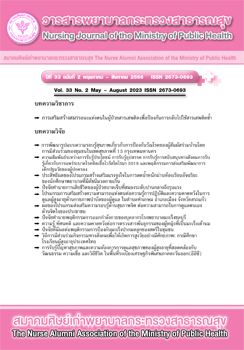Perceptions of Health Problems and Healthcare Needs of the Elderly with Respect to Culture, Beliefs, and Ways of life in the Eastern Economic Corridor zone (EEC)
Main Article Content
Abstract
This descriptive study aimed at assessing perceptions of health problems and healthcare needs among the elderly with respect to culture, beliefs, and ways of life in the Eastern Economic Corridor. The study compared perceptions of health problems and healthcare needs among the elderly with differences in gender, age, frequency of medical treatment, and congenital diseases. The population of this study was older people who were 60 years and older. A sample of 440 participants were recruited by the multi-stage sampling technique. The questionnaire developed by the researchers included 3 parts: general information, health problem perceptions, and healthcare needs among the elderly. Data were collected via an interview with the researchers. The statistics used were frequency, percentage, mean, standard deviation, and independent sample t-tests. The results showed that the majority of the sample was female (71.8%) with ages between 71-80 years old (54.8%). Most of them (68.4%) had upper elementary education level, receiving medical treatment 1-5 times was 66.6%, with 54.4% having congenital disease. The study found a high level of perception of psychological health problems (Mean 3.61, SD=.35), and a moderate level of perception of physical and spiritual health problems (Mean 3.18, SD=.47). Their healthcare needs, which included personal factors, ways of life, and lifestyle behavior, were at the highest level (Mean 4.52 (SD=.71), Mean 4.51 (SD=.78) and Mean 4.50 (SD=.81)), respectively. Differences in gender, age, and frequency of medical treatment significantly affectedin perceptions of health problems and healthcare needs. Differences in congenital diseases also showed a significant difference in perceptions of health problems.The researchers suggest that the findings can be used to expand the body of knowledge and innovation in transcultural nursing services for the elderly.
Article Details

This work is licensed under a Creative Commons Attribution-NonCommercial-NoDerivatives 4.0 International License.
บทความและรายงานวิจัยในวารสารพยาบาลกระทรวงสาธารณสุข เป็นความคิดเห็นของ ผู้เขียน มิใช่ของคณะผู้จัดทำ และมิใช่ความรับผิดชอบของสมาคมศิษย์เก่าพยาบาลกระทรวงสาธารณสุข ซึ่งสามารถนำไปอ้างอิงได้
References
The United Nations. World Population Prospects 2019 Highlights. 2019 [Retrieved October 1, 2020], Avialable fromhttps://population.un.org/wpp/Publications/Files/WPP2019_Highlights.pdf
Thailand Creative & Design Center. Looking ahead to 2050: moving towards an aging society. (Aging Society). 2019. [Retrieved October 1, 2020], from https://web.tedc.or.th/th/Articles/Detail/Aging. Society-2050.
Yamwong N. Quality of life and physical activities of daily living among elderly patients at HRH Princess Maha Chakri Sirindhorn Medical Center. Journal of Medicine and Health Sciences 2014, 21(1): 37-44.(in Thai)
Turnbull N, Chada W, Chuppawa W, Seedaket S, Chanaboon S, Sangswai B, Chaichanwattana S Tangpratchayakun N. Health status and factors associated with self-care among older adults. Nursing Journal of the Ministry of Public Health; 2020, 30(3) : 35-49.(in Thai)
Kongarin N, Ruenkham C Upra R. Factors influencing health conditions of the elderly from the middle aged up in Chiang Mai. Chiang Mai: Boromarajonani College of Nursing. 2009.(in Thai)164
Cho YI, Lee SY, Arozullah AM, Crittenden KS. Effects of health literacy on health status and health service utilization amongst the elderly. Social science & medicine 2008, 66(8):1809-16.
Kitreerawutiwong N, Mekrungrongwong S. Factor influencing health behavior among elderly living in the community. The Public Health Journal of Burapha University 2016, 11(1): 63-74.(in Thai)
Sirasunthorn P. Culture and health. Documentation of lecture topics culture and health for undergraduate students Faculty of Nursing, University Naresuan. 2016. [Retrieved October 1, 2020], Available from www.socsci.nu.ac.th.pdf.(in Thai)
Kaewanuchit C, Thongpoon K Chaikan A. Steps towards public health reform, fundamentals in the 21st Century. Journal of Public Health. Burapha University 2014; 9(2), 108-120.(in Thai)
Songwatthana P. Nursing Research Across Cultures: Research Concepts and Issues. Thai Journal of Nursing Council 2014; 29(4), 5-21. (in Thai)
Leininger, MM. Cultural care diversity and university: A theory of nursing. New York: John.1991.
Giger, JN., Davidhizar, RE. Transcultural nursing: assessment and intervention (4th ed).St. Louis: Mosby. 2004.
Overall diagram for the development of the Eastern Special Development Zone. Macroeconomic effects of Development of the Eastern Economic Corridor (EEC). 2018. [Retrieved on October 1, 2020]. Available from https://www.eeco.or.th/web-upload/filecenter/untitled%20folder/eec001-7.pdf
Sombunrattanachoke T Lomthaisong W. The comparison of quality of life for the elderly in Eeastern Economic Corridor (EEC). Rambhai Barni Research Journal; 2020, 14(2):12-22.(in Thai)
The Bureau of Registration Administration. Official statistics registration systems: Age population. 2022. [Retrieved on August 7, 2023]. Available From https://stat.bora.dopa.go.th/stat/statnew/ statMenu/newStat/home.php
Yamane, T. Statistics, An Introductory Analysis,2ndEd., New York : Harper and Row.1967.
Sasuad K. Factor affecting the quality of life of the elderly in the Eastern province. NRRU Community Research Journal; 2017, 11(2) : 21-38. (in Thai)
Gajewski P D, Falkenstein M. Physical activity and neurocognitive functioning in aging—A condensed updated review. European Review of Aging and Physical Activity 2016, 13(1): 1–7.
Coyle C E, Dugan E. Social isolation, loneliness and health among older adults. Journal of Aging and Health 2012, 24(8): 1346–363.
Svantesson U, Jones J, Wolbert K, Alricsson M. Impact of physical activity on the self perceived quality of life in non-frail older adults. Journal of Clinical Medicine Research 2015, 7(8): 585–93.
Meinerding M, DeFeis B, Sunderaraman P, Azar M, Lawless S, Perez-Vivaldo C, Gu Y, Stern Y, & Cosentino S. Assessing dependency in a multiethnic community cohort of individuals with Alzheimer's disease. Innovation in Aging; 2018, 2(1): 1–7.
Olsen C, Pedersen I, Bergland A, Enders-Slegers M J, Patil G, Ihlebaek C. Effect of animal-assisted interventions on depression, agitation and quality of life in nursing home residents suffering from cognitive impairment or dementia: A cluster randomized controlled trial. International Journal of Geriatric Psychiatry 2016, 31(12): 1312–1321.

